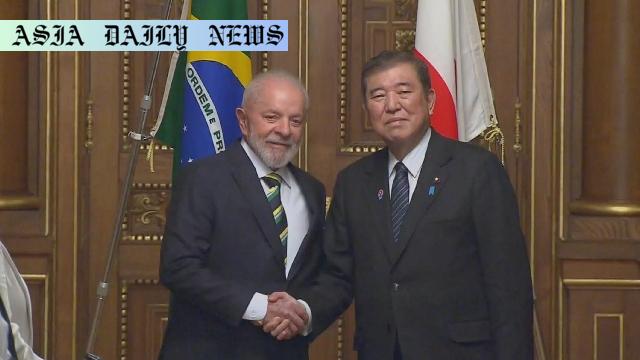Cooperation: Japan and Brazil reaffirm their diplomatic and economic partnership, celebrating 130 years of ties.
The leaders of Japan and Brazil celebrate 130 years of diplomatic ties.
Agreements include biennial summits and dialogue frameworks.
Economic ties and trade relations were a central focus of discussions.
Both leaders addressed critical geopolitical concerns worldwide.

Celebrating 130 Years of Bilateral Relations
Japan and Brazil are commemorating an exceptional milestone: 130 years of diplomatic ties. This historic occasion set the stage for significant bilateral discussions in Tokyo, where Japan’s Prime Minister Ishiba Shigeru and Brazilian President Luiz Inacio Lula da Silva convened to bolster their partnership. Given that Lula is the first state guest to Japan post-COVID-19, this summit symbolized a renewed commitment to international cooperation and camaraderie between the two nations.
During the meeting, the leaders reflected on the long-standing relationship between their countries, shaped by a legacy of mutual respect, trade, and cultural exchange. The discussions highlighted shared values around upholding international rules and fostering global stability. Lula remarked that this juncture represents a pivotal opportunity to reimagine Brazil-Japan relations and elevate them into a new strategic dimension.
Strengthening Strategic Partnerships
The discussions in Tokyo resulted in a comprehensive plan to intensify cooperation, underscored by the leaders’ commitment to hosting biennial summits. Additionally, Ishiba and Lula agreed to create a structured framework for dialogue between their foreign affairs and defense ministries. This initiative aims to promote transparency and collaboration in addressing global and regional challenges.
Both leaders expressed solidarity over pressing geopolitical issues, including the conflicts in Ukraine, the Middle East, and East Asia. Their joint stance against unilateral actions that seek to alter the status quo through force or coercion demonstrates a shared commitment to peace and diplomacy on a global scale.
Deepening Economic and Trade Relations
Economic collaboration was a central focus of the bilateral talks. Ishiba and Lula confirmed their intention to strengthen trade and investment relationships, leveraging platforms like the World Trade Organization (WTO) to promote fair practices. The discussions reflected shared concerns about protectionist policies and their implications on global commerce, emphasizing the importance of an open, rules-based international trade system.
Beyond trade, the leaders explored opportunities to cooperate in emerging sectors such as renewable energy, technology, and infrastructure development. These areas have the potential to fortify economic ties while addressing critical global challenges, such as climate change and digital transformation.
Japan and Brazil: Partners in International Cooperation
At the joint news conference following their meeting, both leaders emphasized the importance of their partnership in an increasingly divided global environment. Ishiba described Brazil as a vital ally for promoting international cooperation and expressed optimism about the future of their bilateral relationship. Lula, in turn, highlighted Brazil’s aspirations to strengthen its international presence and contribute meaningfully to shared global objectives.
This historic summit not only reaffirmed Japan and Brazil’s commitment to their longstanding friendship but also set a forward-looking agenda aimed at fostering mutual trust, shared prosperity, and global peace.
Commentary
The Significance of Revitalizing Japan-Brazil Relations
The recent talks between Japan’s Prime Minister Ishiba Shigeru and Brazil’s President Luiz Inacio Lula da Silva are a testament to the enduring importance of strategic alliances in today’s interconnected world. By celebrating 130 years of diplomatic ties, the two nations reaffirmed their shared history and their commitment to addressing future challenges together. In an era marked by global uncertainty, such partnerships are vital for fostering stability and progress.
A Multifaceted Partnership with Global Implications
What stands out about the Japan-Brazil summit is the broad scope of the discussions. From economic cooperation and trade to defense and foreign policies, the dialogue underscores the potential of bilateral relationships to influence global systems positively. The leaders’ united stance on critical geopolitical issues, including conflicts in Ukraine, the Middle East, and East Asia, reflects their shared values and a mutual commitment to upholding international norms. Such solidarity is crucial as the world grapples with deepening divisions.
Economic Collaboration: A Win-Win Scenario
Economic collaboration holds transformative potential for both countries. By focusing on increasing trade and investment and promoting sectors like technology and renewable energy, Japan and Brazil are setting an example of how nations can work collectively to address shared challenges. This approach not only strengthens their economies but also contributes to global efforts to foster sustainability and innovation. The reaffirmation of their support for a rules-based international trade system, through the World Trade Organization, highlights their dedication to equitable and fair practices.
Looking Forward
As highlighted during the summit, the commitment to biennial summits and the establishment of dialogue frameworks marks a significant step forward for Japan-Brazil relations. These initiatives lay the foundation for a stronger, more resilient partnership that can adapt to the changing dynamics of the 21st century. It is particularly heartening to see alliances focused on collaboration and mutual benefit rather than competition. The Japan-Brazil partnership serves as an inspiring example of what diplomacy can achieve when rooted in shared respect and a common vision for the future.


